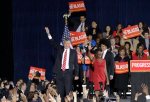Two weeks ago we learned that the National Security Agency (NSA) has been spying on the chancellor of Germany and on the president of the United States. Last week we learned that it has spied on the Pope and on the conclave that elected him last March. This week we learned that it also has spied on the secretary general of the United Nations and has hacked into the computer servers at Google and Yahoo.
Videos by Rare
What’s going on?
President Obama, who has yet to address these outrages to serious questioners, must know of them because apparently he has gotten into the habit of wanting to know in advance what is on the minds of those with whom he is scheduled to meet. The New York Times reported recently that it learned from NSA whistleblower Edward Snowden that the NSA happily told Obama what U.N. Secretary-General Ban Ki-Moon was planning to ask him well in advance of when he asked it. The NSA could have learned that only from its surveillance of the secretary general’s personal cellphone calls, emails and texts. It seems the NSA is providing this service to its clients, and chief among them is the president.
Also among them are other parts of the government, such as the Department of Justice, the IRS, the FBI and the Department of Homeland Security. This is where we find even more dangers to personal freedom than the constitutional violations and personal privacy outrages visited on all Americans and on foreign officials. The NSA claims it can operate outside the restraints of the Fourth Amendment. The NSA and its congressional apologists have argued that because its task is essentially to gather foreign intelligence for national security purposes only, and because the Fourth Amendment, which requires detailed language in search warrants particularly describing the person or place to be searched and the person or thing to be seized, only restrains the government when it is engaged in criminal prosecutions and not when it is on a fishing expedition for intelligence purposes, the Fourth Amendment does not restrain the NSA.
Yet, the plain language of the Fourth Amendment protects everyone in America from government intrusion in their persons, houses, papers and effects, whether the government is looking for evidence of crimes or of evidence of sophistry. The NSA’s argument that the Fourth Amendment only regulates criminal prosecutions is nonsense. It never has seriously been made to or accepted by the Supreme Court, and it defies what we now know about the client list of the NSA. Its clients consist surely of the 15 or so other intelligence agencies in the federal government. But its clients are also the premiere federal agencies that decide whom to prosecute. In order to decide whom to prosecute, these agencies need to examine evidence. And if the evidence they are examining has come through extra-constitutional means, these agencies are destroying the fabric of liberty they have sworn to uphold, which includes the use of only lawfully and constitutionally gathered evidence.
The NSA’s own behavior defies its argument that so long as it is not involved in obtaining evidence for criminal prosecutions, it is free to use extra-constitutional means to gather data. The whole purpose of the Fourth Amendment is to prevent the government from going house to house without probable cause until it finds evidence of a crime — as British soldiers did to the colonists — and then using that evidence in criminal prosecutions. But if the NSA can go from computer to computer without probable cause until it finds what it wants — and turn some of that evidence over to law enforcement — the Constitution’s protections effectively have been short-circuited.
Why does the government, which has sworn an oath to uphold the Constitution, find ways to short-circuit it? The answer goes to the nature of government. Even in a free society, government always grows, always expands and always wants to control more human behavior. But government that operates in secrecy, where no one can see it and criticize it, will do whatever it can get away with — like spy on the Pope, share unconstitutionally acquired evidence with law enforcement or sate the president’s curiosity.
As if all of this were not bad enough, we learned just a few days ago that the NSA has hacked into the enormous computer servers of Google and Yahoo. These two companies, which have been coerced into and rewarded for their cooperation with the NSA, have now been betrayed by their spying partners in the government. They must have been gullible enough to believe that all NSA access to their hardware had been by consent or at least by court order and with their knowledge. It is almost inconceivable that any judge of the FISA court ordered hacking, as that is expressly prohibited by federal statute. Hacking is criminal no matter who orders it.
Even some of the president’s congressional supporters now acknowledge that the NSA is out of control and destroys more liberty than it protects.
Why would the NSA do all of this? Because in secret it can cut constitutional corners with impunity. And it no doubt believes it is easier to tap into the telephones and computers of all 330 million of us who live in the United States in order to monitor the few dozen among us whom it really wants to watch than to develop probable cause against its true targets as the Framers intended and the Constitution expressly requires. And, as well, who knows what teasing cute morsel its agents can deliver to the president before his next Oval Office visitor arrives?
Is this the government the Framers gave us? Is this the government to which we consented? Is this the government most conducive to personal liberty in a free society? The answers are obvious.
© ANDREW P. NAPOLITANO
DISTRIBUTED BY CREATORS.COM
Related articles
- NAPOLITANO: Jefferson weeping (rare.go-vip.net)
- NAPOLITANO: A government of secrecy and fear (rare.go-vip.net)
- NAPOLITANO: The truth shall keep us free (rare.go-vip.net)
- NAPOLITANO: Domestic spying is dangerous to freedom (rare.go-vip.net)



